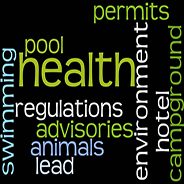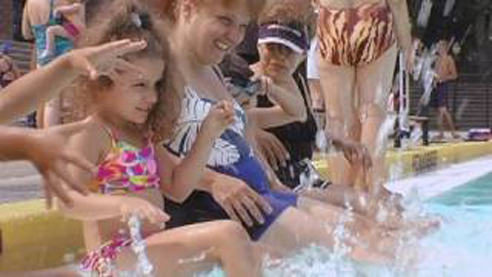Permitting Tourist Establishments
Hotels, motels, and campgrounds are permitted by the health department. This ensures that any food, water and sewage is managed properly onsite. Details about these regulations and to obtain applications for permit can be found on the VDH’s regulation website.
Swimming Pools
Healthy Swimming
While swimming is fun and games, it is still a way that a variety of diseases can be spread. Swimming areas can be infected by germs through many different ways, such as the germs washing off of the body while swimming. Here are some tips to keep your swimming areas healthy for all users!
- Don’t use the restroom in swimming areas.
- Always wash your hands after using the restroom.
- Don’t swim if you have diarrhea because you could spread the illness to other swimmers.
- Swim diapers and swim pants delay the leaking of germs into swimming water, but do not prevent the leaking of germs.
- Frequent diaper changes and bathroom breaks are recommended.
- Never drink or swallow swimming water.
- Keep wounds and/or cuts out of the water.
- Shower before swimming to remove germs from your body.

Helpful links:
Safe Swimming
Swimming, like any activity, can be done in a safe or unsafe way. You should always be prepared for anything. Here are a few points to remember while swimming.
- Take swimming lessons.
- Always use sunscreen to protect yourself from skin cancers.
- Use life jackets even if the child has taken swimming lessons.
- Only swim in designated swimming areas.
- Don’t swim in the dark.
- Don’t swim alone.
- Don’t dive into shallow swimming areas or above-ground pools.
- Never leave a child alone in or near swimming areas.
- Make sure the swimming areas are properly maintained.
Helpful links:
Regulations
Pool regulations were created to make sure that pools provide a safe and fun environment for the public. The health department regulates and inspects pools at permitted establishments. For more information on those regulations, visit this website: Pool Regulations.
Lead
Lead is a soft, but dense metal that is used to make certain products that we use such as bullets, ceramic dishes, electronics, and car batteries. Lead is a toxic substance that causes damage to the human body if a person is exposed. It is especially dangerous to young children under the age of 6 years old.
The biggest source of lead poisoning comes from houses that were built before 1978, before lead paint was banned. The paint usually chips, peels, or forms lead dust. This can then be consumed by children.
Fish Consumption Advisories
Sometimes our water is exposed to dangerous chemicals which affect the wildlife living in those areas. These exposed animals can become toxic to eat once introduced to such chemicals. It is important to be aware of which areas have been affected and which areas are safe to eat from. Visit the link below for specific details on fish consumption advisories.
Fair Events
At most fair events in our local area, there are animal exhibits available for the public. When attending these exhibits, it is important to wash your hands after handling an animal and/or visiting an animal exhibit. This helps to decrease the spreading of diseases from the animals to other people.
Stay Healthy at Animal Exhibits
CDC Animal Exhibits
